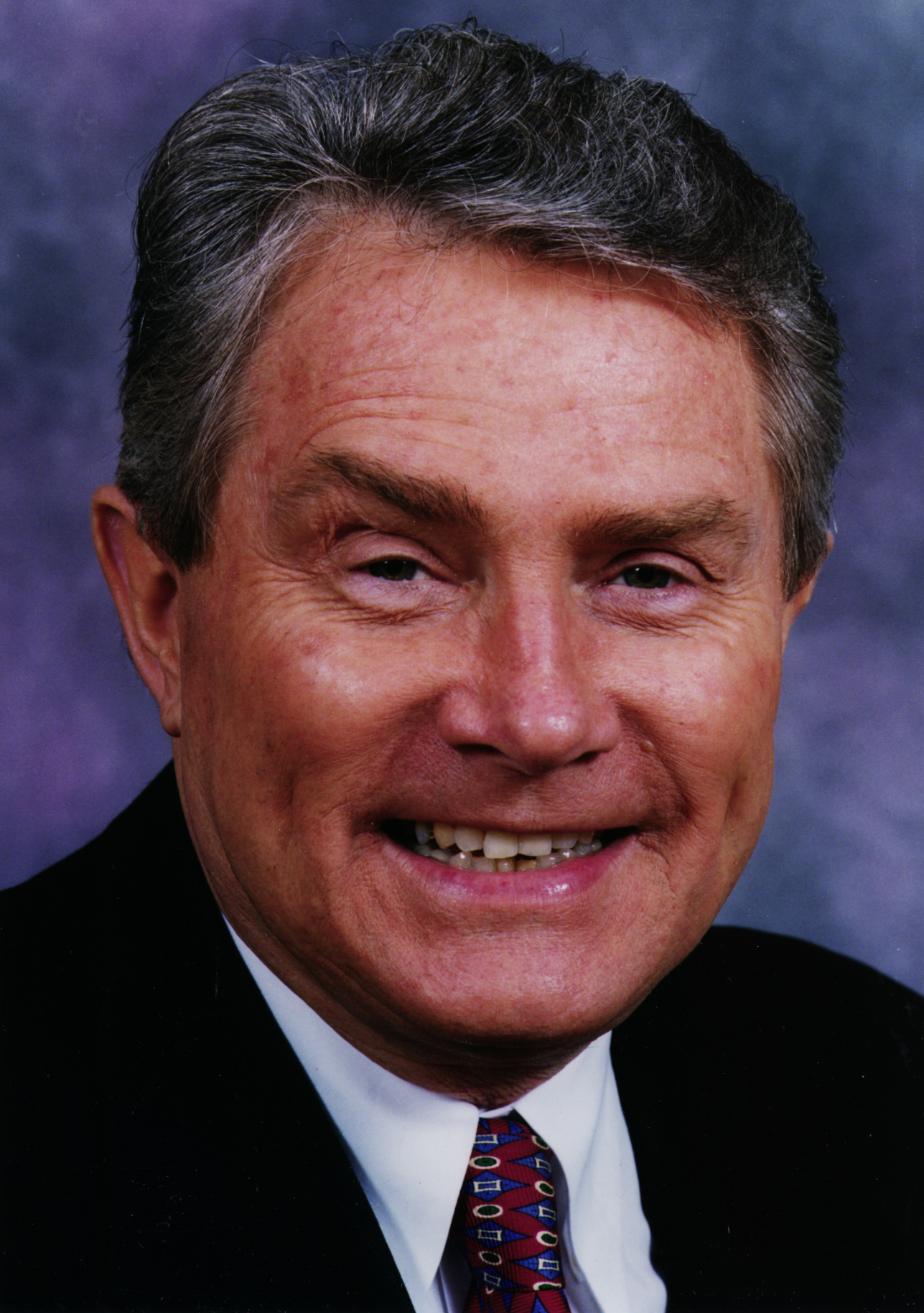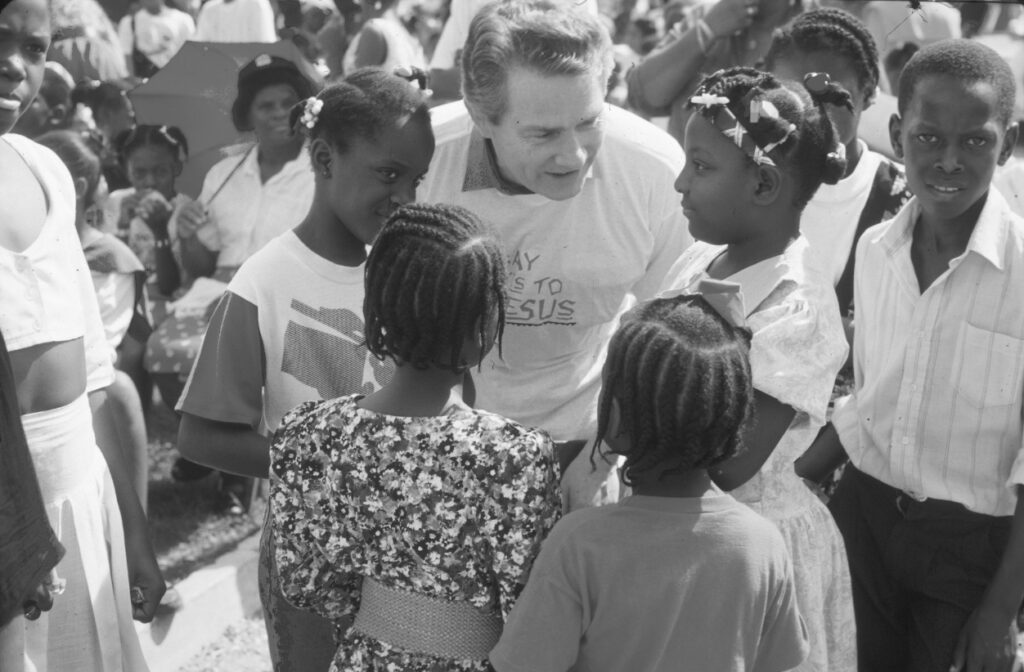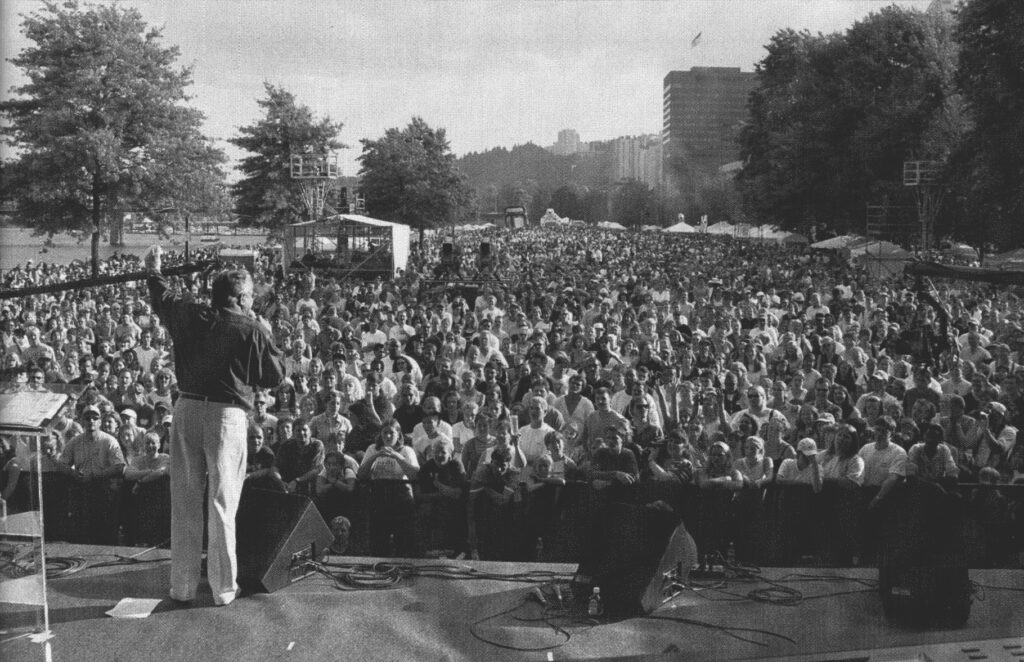Luis Palau, Evangelist to Speak at Yale
If someone told you, “There’s a man I know who has maxed-out major stadiums around the world from Bogotá to Bucharest!” you’d probably think, “Big deal. Just another rock star on world tour, right?” But if you heard then that the man can’t sing for beans, that he got his first break as an Argentinean banker . . . Are you curious yet?
Luis Palau
1934 – 2021
His name is Luis Palau. And the crowds that gather, including the record 600,000 that poured into Guatemala City in 1982, have come for one purpose, to hear this man tell them as he did just recently out in Oregon, “The Lord has forgiven your sins.”
Luis Palau, Evangelist to Speak at Yale
This was published in the spring of 2001 in the Yale Standard.
If someone told you, “There’s a man I know who has maxed-out major stadiums around the world from Bogotá to Bucharest!” you’d probably think, “Big deal. Just another rock star on world tour, right?” But if you heard then that the man can’t sing for beans, that he got his first break as an Argentinean banker . . . Are you curious yet?
His name is Luis Palau. And the crowds that gather, including the record 600,000 that poured into Guatemala City in 1982, have come for one purpose, to hear this man tell them as he did just recently out in Oregon, “The Lord has forgiven your sins.” He’s been at it since 1966 and at age 66 he’s still going strong. In fact, he’s coming to Yale April 24.
Palau’s picture on the front cover of his annual ministry report shows an avuncular-looking man, his elfin eyes twinkling with enthusiasm, and face framed by a smile that says, “I can’t wait to get to know you.” “Enthusiasm” and “Palau” are two words often found in close proximity. The British press even used them as synonyms while he was in London.

“He’s not a fire-and-brimstone preacher. He’s more of a storyteller, weaving together personal anecdotes with quotes from Scripture.”
— Boston Globe

Born in Argentina, a third generation immigrant with roots in Spain, France and Scotland, Palau entered life with a multinational flair. He was educated in a British-run boarding school and became fluent in both Spanish and English at an early age. Being bilingual helped him get his first job, working for the Bank of London in Buenos Aires. With his quick mind, strong work ethic and ability to function in both languages he became a valuable asset to the international banking department; so valuable that as an 18-year-old he was put in charge of foreign operations at the Bank’s Cordoba branch.
For such a young man, it didn’t get much better than this. There he was each day with his suit and high salary, a genuine class act rubbing shoulders with the big men around town. There was one catch. It didn’t mean much to Luis. Just six years before, while attending a summer camp, he had decided to give his life to Jesus and become a Christian. In the years following, the temptations of youth had often buffeted his nascent faith. But at each moment of decision, he had become more convinced that real life and joy were found in following God and obeying His will above all else. Now he began to ask, did God want him to be a banker or might there be something else?
He enjoyed the bank. His work was challenging and he was grateful for a salary that supported his mother and siblings, but as time went by, he found that his heart was pulling him elsewhere. He began to dream of being a full- time “minister of the Gospel.”

For months he struggled over the decision. He needed the money, didn’t he? Who else would support his family? He prayed, sought advice and finally, when an opportunity arose to work fulltime for a local church, he put his cares in God’s hands and turned in his resignation. A very great adventure began.
Palau’s involvement in this kind of work actually went back to his childhood. The Argentina of his youth was almost exclusively Roman Catholic in its religion. While Luis was still quite young, his father, Luis Sr., became an evangelical Christian, meaning that he chose a personal relationship with Jesus—apart from any official church structure—as the foundation for his faith.
In the years that followed, His father would spend his free time walking through the surrounding villages, telling people that they too could know God and be forgiven for their sins. Luis often went with him.
Luis Sr.’s faith, and the way it eased his dying hours, made a big impression on his son. It was in 1944, when penicillin was scarce because of the war, that Luis’ father was diagnosed with bronchial pneumonia. He lasted just ten days.
It was the last day, just before the end, that was so special. “[In] contrast to the typical Latin American scene, where the dying person cries out in fear of going to hell,” remembers Palau, “[my father] sat up and began to sing: ‘Bright crowns up there, bright crowns for you and me.’ Then lying back against the pillow he said, ‘I’m going to be with Jesus, which is far better.’” And a little while later, he was gone.
“Where, O death, is your sting?” says the Bible. If you believed in Jesus, learned Luis, that sting was taken away. Sadness, surely, at the passing of a loved one, but the power of death was broken! When asked by reporters recently what message he was bringing to their state, Palau replied, “I want people to know they are going to heaven when they die, and between now and then, I want them to be happy.”
After he left the bank, Palau worked for a few years with a local ministry, then came to the United States to finish his education. He was 26. While here he married, and eventually became a citizen. Then, in 1964, he returned to South America where his career as an evangelist finally began to take shape.
In the years since, Luis Palau has traveled to over 65 nations sharing his message of joy and victory in life with over 13 million people in person and with tens of millions more through other media. His reputation has grown to the point where he is often compared with Billy Graham, the most prominent evangelist of our time.
“If Billy Graham epitomizes classic 1950s American virtue,” wrote the Miami Herald, “Palau represents continent-straddling 21st-Century multiculturalism.” Palau, of course, has his own unique style. “He’s not a fire-and-brimstone preacher,” wrote the Boston Globe. “He’s more of a storyteller, weaving together personal anecdotes with quotes from Scripture.”
On April 24, Luis Palau will be here on the Yale campus to tell the tale of God’s amazing love, one more time. Just over a century ago, at exactly this time of year, students turned out in droves to hear the same message from another man of energy and enthusiasm, the great evangelist D.L. Moody. Some came to listen, others to mock, but even the mockers found themselves surprisingly changed by what they heard. Moody spent six weeks in New Haven.
Luis Palau will only be here for one night. Don’t miss him!
Ben Lyons, Columbia U., Grad ’99
